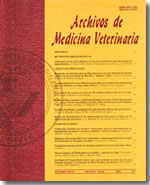Effect of increasing pasture allowance and concentrate supplementation on animal performance and microbial protein synthesis in dairy cows
Main Article Content
Abstract
This study was undertaken to evaluate the influence of daily pasture allowance and concentrate supplementation on dairy cows during autumn. The study lasted 56 days using 30 Holstein Friesian cows. The treatments resulted from a combination of two pasture allowances (L = low allowance, 20 and H = high allowance, 30 kg of DM cow-1day-1, measured at ground level) and three concentrate levels (0, 3 or 6 kg cow-1 day-1). All the cows received 4.5 kg cow-1 day-1 of grass silage. The increase in pasture allowance had no effect on milk production (P > 0.05), but increased the protein concentration in milk (from 3.02% to 3.21%) (P < 0.05), body weight gain (0.336 to -0.121 kg) and the grazing time (299 min cow-1 day-1 to 411 min cow-1 day-1) (P < 0.001). Concentrate supplementation increased milk production (15.1, 19.2 and 21.7 kg cow-1 day-1) (P < 0,001), fat yield (+0.1 kg cow-1 day-1) and protein yield (+0.1 kg cow-1 day-1), decreasing milk urea (-0.25 mmol/L-1 day-1), (P < 0.001). Increasing pasture allowance or the concentrate offered had effect on NEFA and plasma urea-N concentration during the experiment. High pasture allowance increased (P < 0.05) purine derivatives excretion and PDPD/CT ratio, but not effect was observed by concentrate supplementation. Supplementation with concentrate had a positive impact on performance as a result of a better protein-energy balance of the diet.

